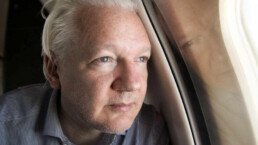After over half a decade of imprisonment and constant government harassment, Julian Assange is free and speaking out for freedom of speech and human rights. His freedom is a relief, but the state of protections for journalists like him is far from strong.
By Chip Gibbons, Jacobin
“I am not free today because the system worked,” Julian Assange told an assembled group of parliamentarians from across Europe earlier this week. “I am free today because after years of incarceration I pled guilty to journalism. I pled guilty to seeking information from a source. I pled guilty to obtaining information from a source. And I pled guilty to informing the public what that information was. I did not plead guilty to anything else.”
These words marked Julian Assange’s first public remarks as a free man, and his first significant public comments in over half a decade. Assange gave his last public interview in 2018. From 2019 until June 2024, he had been held in a maximum-security prison, largely unable to speak directly to the public.
Since agreeing to plead guilty under the Espionage Act to what essentially amounts to journalism, Assange has largely avoided the public eye. He has given no interviews and maintains no social media accounts. His wife, Stella, has explained that Assange, who endured what a United Nations expert labeled “torture,” needed time to recover.

But on October 1, 2024, Assange delivered testimony to the Parliamentary Assembly of the Council of Europe (PACE). The council is a body of forty-six European countries tasked with protecting human rights in Europe. PACE’s members are parliamentarians in their respective countries.
PACE has repeatedly expressed concern about Assange’s detention and the US case against him. It appointed Þórhildur Sunna Ævarsdóttir, an Icelandic parliamentarian from the Pirate Party, to act as its official rapporteur on “the detention of Julian Assange and its chilling effects on human rights.” As part of her work, she asked Assange to testify before a committee on the day before the larger PACE group was to debate a resolution she put forward as part of her mandate. The resolution declared Assange had been a political prisoner during his detention and called on the United States to reform its Espionage Act. It passed 88–13, with 20 abstentions.
Recent Posts
“Arrest Now, Ask Questions Later”: Why Did L.A. ICE Agents Arrest and Jail U.S. Citizen Andrea Velez?
July 3, 2025
Take Action Now “They didn’t have vests that said ICE or anything. Their cars didn’t have license plates. … Just because of the color of our…
Trump’s Big, Beautiful Bill Is Naked Class War
July 3, 2025
Take Action Now Trump’s “Big, Beautiful Bill” trades tax cuts on millionaires for the dissolution of society.By Hamilton Nolan, In These Times…
Mayor Mamdani’s First Day, A Zero Hour Conversation With Richard Wolff
July 2, 2025
Take Action Now If elected, what would Mayor Mamdani do on his first day in City Hall? How would a democratic socialist govern as a big-city mayor?……
The U.S. Is Funding A Bloodbath At Gaza Aid Centers
July 2, 2025
Take Action Now The admin just gave $30M to GHF, the organization at the center of charges that Israel is weaponizing assistance and shooting at…




